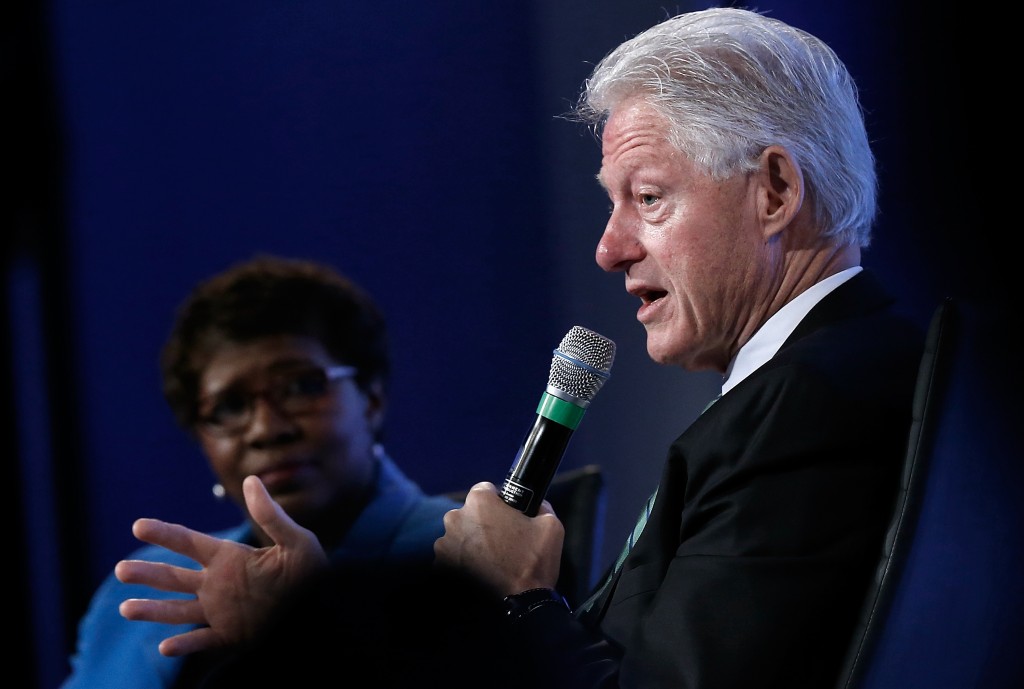Former President Bill Clinton sat down for an hour-long conversation with Gwen Ifill Wednesday at the Peter G. Peterson Foundation’s fifth annual fiscal summit. Photo by Win McNamee/Getty Images
May 16, 2014
I won’t lie. It’s always gratifying when an interview gets headlines. We cover the news, but it’s also kind of fun to make news from time to time.
So I knew when I walked on stage to interview former President Bill Clinton at the Peter G. Peterson Foundation’s annual fiscal summit this week that I would ask about the day’s hot topic: Republican strategist Karl Rove’s questions about Hillary Clinton’s health and age.
As retold in the pages of The New York Post, Mr. Rove had suggested that Mrs. Clinton suffered a “traumatic brain injury” in a fall about 18 months ago that was far more serious than the Clintons disclosed.
Mr. Clinton was clearly prepared for my question about the Rove comments, and defended his wife while shrugging off the perceived accusation with a prepared joke. “First they said she faked her concussion,” he said. “Now they say she’s auditioning for a part on ‘The Walking Dead.’ I mean, you know, whatever it takes.”
As the audience laughed, the former president glanced over to make sure I was smiling too.
But here’s the thing. That was my final, and certainly least serious, question in a nearly hour-long conversation. If that’s the only thing you heard about that interview, here are some of the other interesting things he had to say that you may have missed.
Bill Clinton on his wife’s health.
Inequality
President Clinton is keenly aware of his economic record. The economy did spectacularly well during his years in office, but he has also been accused of setting the table for the 2008 financial collapse by loosening regulations on corporations and, in essence, feathering the nests of the “1 percent.”
So what about that?
His response: “To reduce inequality, you have to have tight labor markets and a changing job mix,” he said. “That’s really the reason that, in the eight years I served, that each quintile of the American economy increased in tandem more than at any time since the mid-‘70s. And you can say, well, inequality has still increased, because the top 1 percent did better, but I don’t think there’s much you could do about that unless you want to start jailing people.”
Cue awkward laughter in the room.
I covered the Clintons’ joint effort to get comprehensive health care passed in 1993 for The New York Times, so I knew he was a booster of the Affordable Care Act that finally kicked into place two decades later. But Mr. Clinton knows as well as anyone that embracing the law –- and President Obama himself –- has proved difficult for many Democrats.
His advice: run toward, not away from, the issue.
“I think we’re rocking along pretty good here,” he said. “It’s a beginning. And I think that the people can handle the truth. Talk about what’s good about it. Talk about the remaining problems. Commit to fix the problems. That’s the best political position.”
Bill Clinton on health care.
Immigration
U.S. Chamber of Commerce CEO Thomas Donohue said recently that if Republicans cannot agree to pass immigration reform, they ought to just give up on 2016.
I asked Mr. Clinton if Donohue was right.
“Well, I wish he were,” he replied, to laughter. “But I fear not. Look, here’s the problem. Immigration reform has been -– the Republicans did a lot to build up their tea party base by being against illegal immigration and making it look like the barbarians were at the gate.
“I think we ought to adopt immigration reform,” he added. “And ironically, if the Republicans did it, it would put them in a position to get a higher percentage of Hispanic votes because, you know, their small business rhetoric, their family responsibility rhetoric, all the stuff that they care about would be quite appealing to a lot of hardworking Hispanic immigrants.”
Russia
Mr. Clinton -– one of a series of U.S. presidents who have found themselves stymied by Vladimir Putin, suggested we should worry less about the Russian president’s territorial ambitions.
“It’s not the end of the world,” he said. “He invaded Georgia, too, and took part of that. I don’t agree with this, and I think we have to be firm against it, but it’s not the end of the world.”
The Catch 22 Second Term
There are only three men living who have served two full terms as president of the United States. I was curious what advice one of them would have for President Obama, who is on the way to joining that very exclusive club.
What’s a president to do who is facing economic struggles at home as well as questions about the forcefulness of his leadership abroad?
“You can’t just have a laundry list of problems in the world, and say there they are and we didn’t make them go away in 48 hours, therefore we don’t have a good foreign policy,” Mr. Clinton said. “I think the president…the debate was banging the daylights out of him for…staying in Afghanistan too long, having too many drone attacks, doing too much on intelligence. So he’s damned if he does and dammed if he doesn’t. That’s the world we’re living in.”
And that’s what you missed.


No comments:
Post a Comment